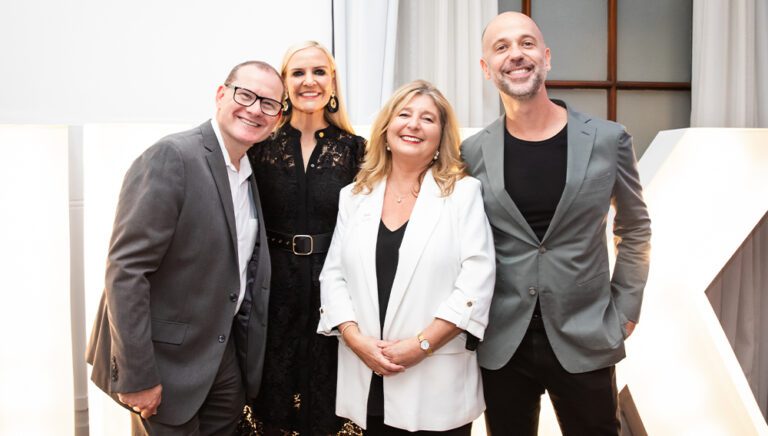The International Media Marketplace (IMM), hosted and organised by TravMedia, recently took place in Sydney. Karryon attends the two-day event to learn more.
The TravMedia IMM takes place early in the calendar each year, with the aim to bring travel brands and their marketing/PR professionals together with Australian travel media professionals.
Day one begins with a Summit event – this year taking place at Four Seasons Sydney, sponsored by Explore Louisiana which is celebrating ‘The Year of Food’ in 2025.
A number of keynote speakers addressed the delegates at the Summit on day one. Day two saw a record 500 people attending the Sydney International Media Marketplace (up from 420 last year) which included the official IMM Luncheon presented by Destination British Columbia.
During the marketplace, more than 3,740 individual meetings took place between 100 exhibitors and media delegates.
Travel Trends and Industry Highlights session
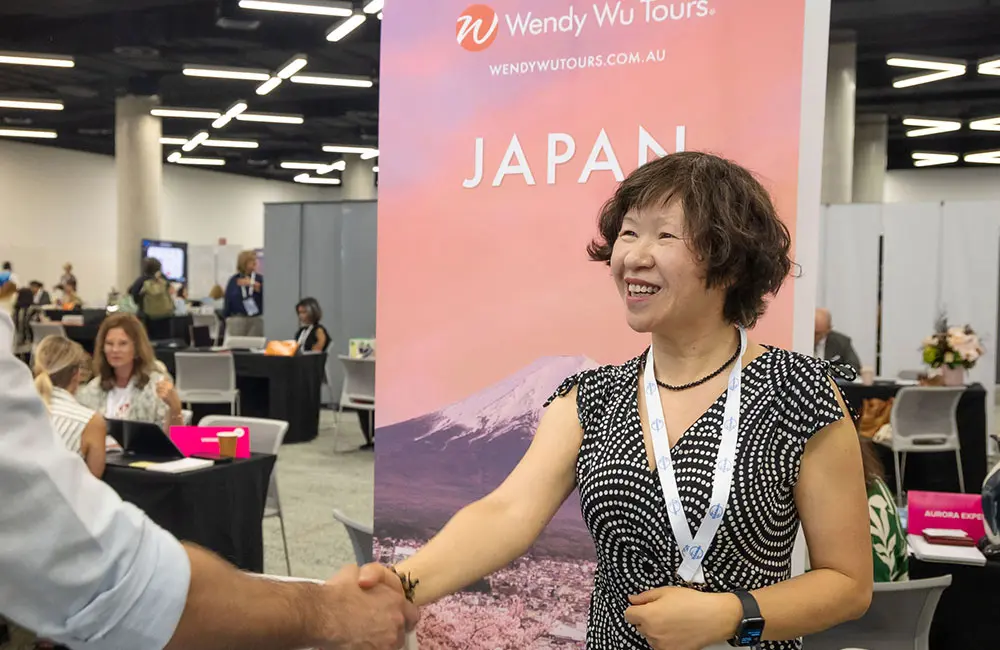
A highlight panel from Karryon’s perspective was the travel trends session, moderated by Darren Karshagen, Senior Director, Expedia Group Oceania.
Joining Karshagen on the panel was Doug Bourgeois, Asst. Secretary of Tourism, Explore Louisiana; James Kavanagh, Global Leisure CEO, Flight Centre Travel Group; Jo McCauley, Chief Executive Officer, Southern Cross Travel Insurance; and Wendy Wu, Founder & Managing Director, Wendy Wu Tours.
A lively, spirited (and as she admitted herself, jet-lagged) Wendy Wu was a definite highlight of the panel, sharing her passion for travel and the business she founded in 1998.
“I am a very proud Australian,” Wendy Wu told the audience during the introduction.
“I started Wendy Wu Tours in Australia and then in 2004, I left my wonderful team behind and expanded into the UK. I am very proud to say that we have won, for 15 consecutive years, the best specialist touring company award in the UK.”
Each delegate was asked to share a favourite food memory. Wendy shared how she coerced her sons to try raw seafood.
“I have twin boys. Before they went to Japan, they were not keen on raw fish – at all. So I took them to a Japanese restaurant and I had to pinch their ears and say ‘you eat’. And the waiters were staring at me. That’s how much they disliked sashimi,” said Wendy. After trialling many dishes during their trip at Wu’s insistence, she said the end result was that “my boys now love Japanese food!”
Key topics including the trends driving travel this year
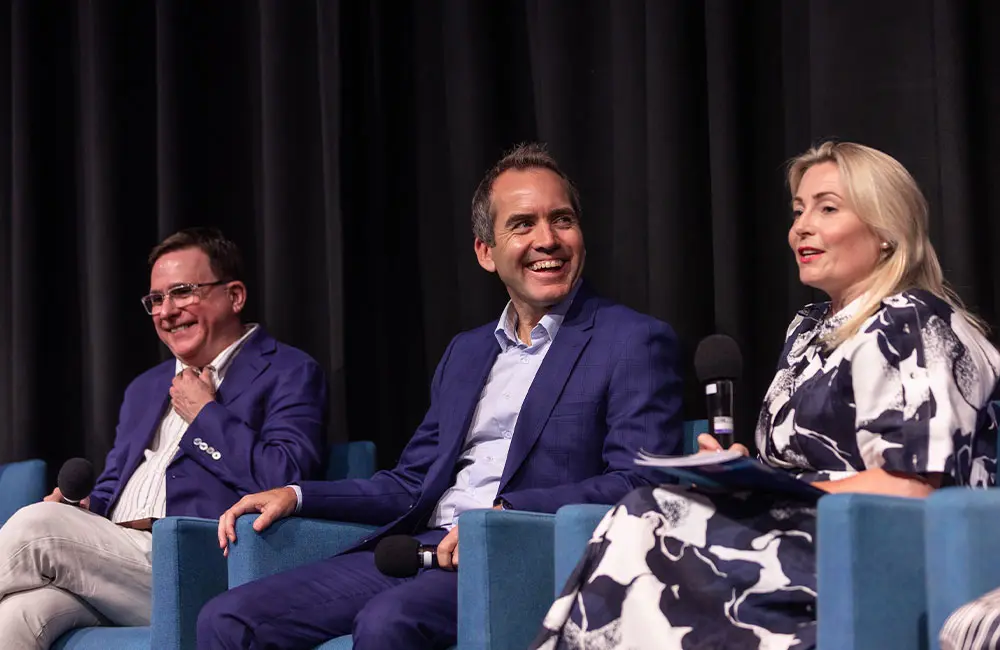
James Kavanagh from FCTG shared that the top 10 most-booked global destinations out of Australia were:
- 1. Australia
- 2. UK
- 3. USA
- 4. New Zealand
- 5. South Africa
- 6. Indonesia
- 7. Italy
- 8. Thailand
- 9. Singapore
- 10. Japan
“What I find really interesting is the mix of long and short. Australia is still the most popular and that signals a lot of short haul travel right here in this country, including close to home cruising where people will sail for three nights and come back for a break.
“What’s interesting is the UK and USA being numbers two and three. Even with talk of the US dollar being not favourable for Australians, it’s right up there still. What was really powering through towards the end of the year was Japan. Overall, it shows first and foremost Australians love to travel.
“When I look back at the history since the 1970s, outbound international has only gone backwards six times since the 70s. We are a growth industry
“We did some recent research that showed that 96 per cent of people are seeking more restful travel now, to connect with loved ones,” said Kavanagh.

As to where people are travelling to, Kavanagh said Bali is very popular and the working-from-anywhere trend is helping to drive this.
“Our latest research shows that one in three are actually combining a business trip with a holiday; and two out of three are saying that they will do it,” said Kavanagh.
Darren Karshagen, Senior Director, Expedia Group Oceania shared results from the Expedia Unpacked 2025 survey data – sourced from all of Expedia’s first-party data globally, and additionally from a survey of 25,000 travellers from 19 countries including Australia.
“One of the key trends we see is how travellers are looking to experience destinations that are a lot less crowded and moving away from the traditional destinations to somewhere they haven’t been before. It’s a trend we’re calling ‘Detour Destinations’,” said Karshagen.
Examples that were shared included exploring Reims as a detour from Paris; Santa Barbara as a detour from Los Angeles; exploring Waikato as a detour from Auckland; or exploring Fukuoka as a detour from Tokyo.
“Over 70 per cent of Australians are looking to visit a destination that is different,” said Karshagen.
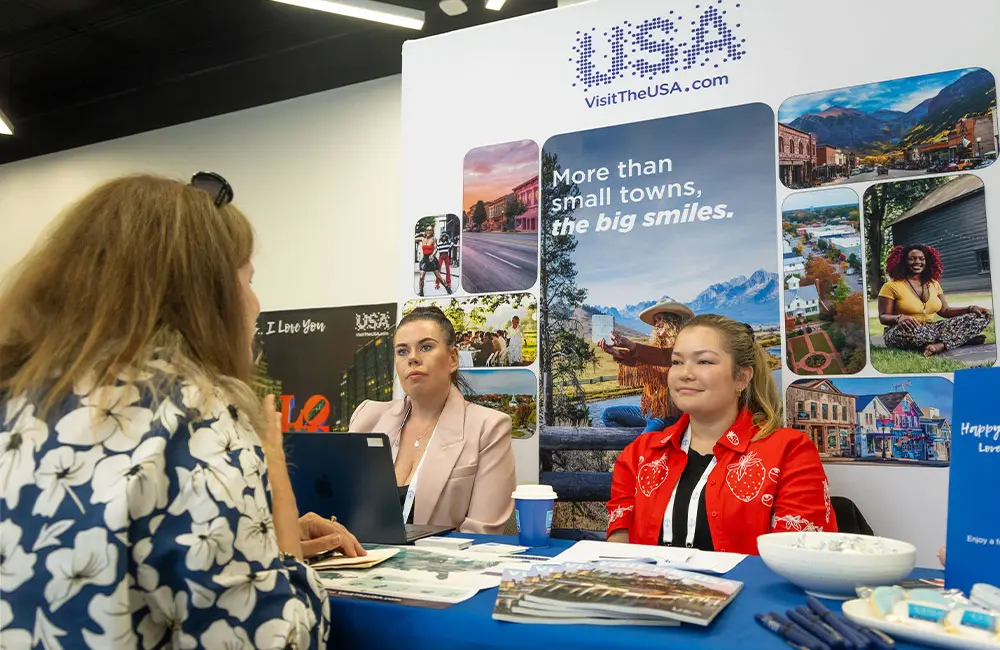
Jo McCauley, Chief Executive Officer, Southern Cross Travel Insurance shared fidnings from SCTI’s Future of Travel Report 2025.
“For us, we’re seeing travel is becoming more and more important for consumers. People are really prioritising travel over other discretionary spending. Nine out of 10 Australians are saying they want to travel in the next 12 months.
“From a travel insurance perspective, what we’re seeing is the value that consumers place on travel insurance. We saw that increase during Covid very much as a result of the increased anxiety during Covid and disruptions…. which is still going on.
“What we see is that consumer attitudes around where their concerns lie now is very much a shift towards disruption from the geopolitical situations with war, riots and also climate change.
Meanwhile, she revealed that the importance of domestic travel insurance has dropped in the eyes of consumers with only 41 per cent of Australians saying it’s a high priority now (compared to 49 per cent in January 2023); while 76 per cent of people will take international travel insurance.
Wendy Wu shared that the biggest trend they’ve noticed is people’s desire for fully immersive travel experiences.
How the cost of living and world affairs is impacting travel
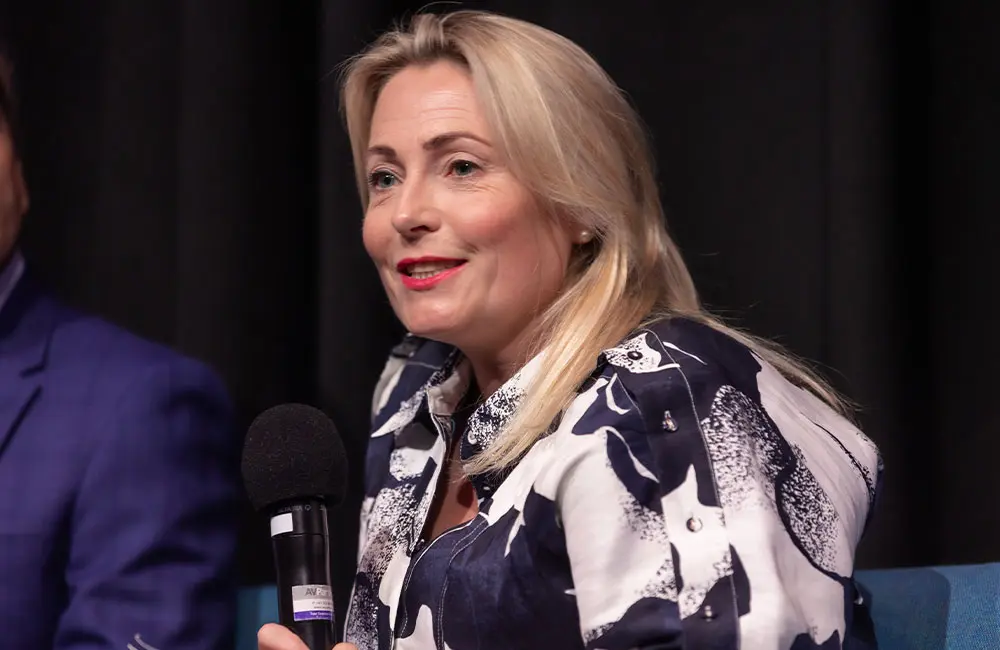
Darren Karshagen from Expedia said over six million Australians are looking to travel overseas. They are becoming more creative in how they budget for and prioritise travel spend.
“They are planning much further in advance. More than 40 per cent are willing to travel in the off season,”
Jo McCauley from Southern Cross Travel Insurance said the group is seeing some really different seasonal trends in their policy sales.
“In terms of cost of living – there’s a real generational divide based around housing affordability. What we’re seeing is that almost 40 per cent Australians over 45 are going to travel a bit less because they want to put money aside to help their children get into the Australian housing market. And we’re seeing the same in New Zealand. Yet, on the other side of it, the under-44 demographic are viewing home ownership as being completely out of reach and thinking ‘what’s the point, I’m going to go on holiday’.

Talking about climate change specifically, McCauley said that over the past six years SCTI is seeing an almost 100 per cent increase in claims as a result of climate change.
“We’re seeing a lot of elderly customers around Europe and Greece affected by heat stroke. It’s quite a new phenomenon. Turbulence claims are also becoming more prevalent and more expensive. The damage customers are doing to themselves on planes as a result of turbulence is more severe,” said McCauley.
Changing travel booking patterns and AI
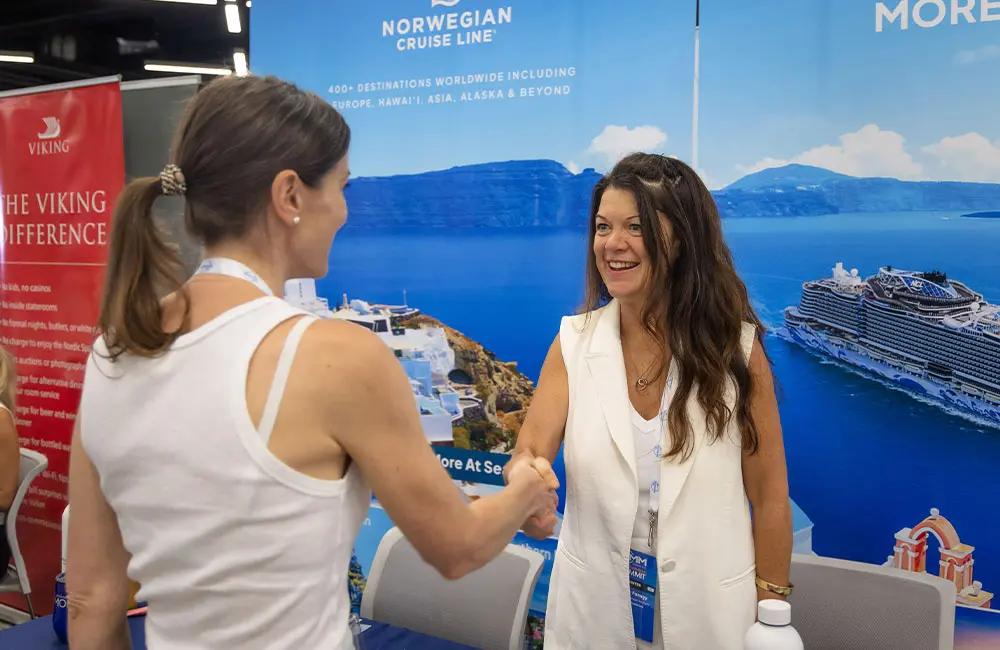
The set-jetting trend continues to inspire travellers, with Karshagen revealing almost two thirds of people are inspired by where they want to travel based on movies and TV. Films and shows such as Emily in Paris, The White Lotus, and Eat, Pray, Love inspiring consumers about where they want to go and experience.
“The second thing we’re seeing is the need for travellers to go and experience natural wonders,” said Karshagen.
“More than 80 per cent of travellers want to make sure they have a front-row seat to those natural wonders and that experience they will take with them for a lifetime,” he said.
James Kavanagh said that one of the things they’ve seen is people now booking well in advance to be able to afford travel again.
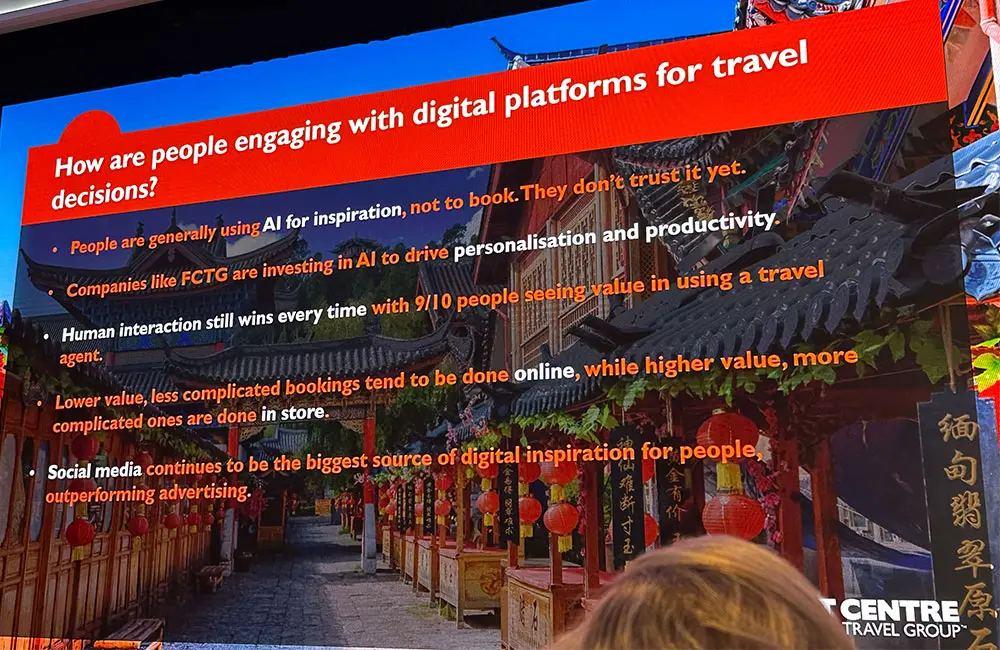
“That pent up demand that we saw post-pandemic has really stabilised into a space of brook well in advance to be able to access a good deal. And the rise of off-peak and shoulder season.
“Last year for the first time we saw September and October out-pacing sales from July to August in the UK and that leads to the affordability factor, it ties in with school holidays… people are wanting to go in the shoulder season.
“We’re seeing a shift in the demographics of people who are travelling. Solo travel after the pandemic surged the most. For the first time in our data we’ve actually seen that shift a little bit on a marginal decline where we’re actually seeing a lift in families and couples start to move a little bit more,” said Kavanagh.

On the role of AI in travel, James Kavanagh said that 57 per cent of travel intenders are either using or are willing to use AI in the travel planning phase.
“But only seven per cent are at the confidence stage of actually booking. This is from a global survey that we did recently and Aussies are actually less confident at the booking stage whereas Americans are actually growing in a lot more confidence. You can see some geographical trends starting to emerge in this space and it’s definitely going to be a huge part of planning into the future,” said Kavanagh.
The 2026 IMM will take place on 26-27 February in Sydney.



